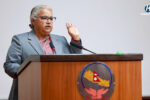KATHMANDU: Team Leader of Dakchyata project Erik Winther-Schmidt Friday formally handed over nine buses to Member Secretary of Council for Technical Education and Vocational Training (CTEVT) Jeeb Narayan Kafle.
The buses are meant for nine CTEVT schools supported under the Strengthening Employer Engagement in CTEVT Schools (SEECS) project, and are provided as part of efforts to increase the accessibility of technical and vocational education and training (TVET) across Nepal.
These buses are expected to provide a safe and reliable means of transport for TVET students to attend training courses, as well as support outward travel of students and instructors alike to visit and interact with businesses and employers in the local area.
Fostering closer links between CTEVT schools and local business and industry is one of the main objectives of the SEECS project, ensuring that skills training provision meets the demands of the local employment market, increasing the employability potential of graduates.
The provision of vehicles represents a practical means of increasing accessibility in the nine schools, alongside a range of other measures designed to support students into training.
CTEVT Member Secretary Kafle thanked the project and declared the buses would help in addressing some of the physical barriers to accessing relevant skills training linked to the labor market.
British Council Nepal Country Director Shahida MacDougall said, “We are proud of our partnership with CTEVT schools to further improve accessibility and inclusion for students & instructors alike – which are one of the key drivers of sustainability. We hope that this initiative will also be beneficial and create additional jobs and economic opportunities for local communities and businesses.”
The SEECS project, which operates through nine CTEVT schools across the country, promotes the capacity building of both public and private sectors on institutional, regional, national, and central levels. The sector specializations of the nine schools ensure a focus on three key industrial sectors (construction, agriculture, and tourism) identified as priority areas by the Government of Nepal.
CTEVT’s role also ensures that models of good practice developed through SEECS will provide a blueprint for other CTEVT schools and private sector training providers to interact more closely with employers, business, and industry.
The SEECS project is implemented by CTEVT with support from the European Union-funded Dakchyata: TVET Practical Partnership project, managed by the British Council in Nepal.









Comment